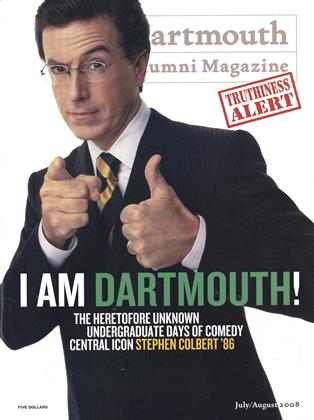Copy Edit U.S.A.
A determined alum takes to the road with his Typo Eradication Advancement League.
July/August 2008 Carolyn Kylstra ’08A determined alum takes to the road with his Typo Eradication Advancement League.
July/August 2008 Carolyn Kylstra ’08A determined alum takes to the road with his Typo Eradication Advancement League.
IN THE NAME OF GRAMMATICAL correctness Jeff Deck '02 has scaled barbwire fences and dodged cacti. He's argued apostrophes, erased errant vowels and ordered deserts for dessert. ("I'll have the Sahara," he told one unsuspecting waitress.)
Deck, a former associate editor at Rocks & Minerals, departed Somerville, Massachusetts, on March 5, beginning a two-and-a-half-month tour in hopes of finding—and fixing—typographical errors. His travels took him roughly clockwise around the country. Along the way he picked up and dropped off fellow grammarian friends, including Benjamin Herson '02. The dedicated team called itself the Typo Eradication Advancement League (TEAL), and members had business cards to prove it.
"I've always noticed errors wherever I've gone, and they've always kind of bugged me and made me feel that I couldn't do anything about them," Deck says. "Eventually I realized that I could, and I thought I could make it a national campaign and raise public awareness about typos and inspire people out there to fix them in their own neighborhoods." A lofty goal, indeed—Deck encountered a total of 423 typos, which he recorded on his blog (www.jeffdeck.com/teal). By the end of his tour he was a typo-hunting veteran (though he'd seen so many signs warning of cars towed at "owners" expense, he admitted to feeling numb to them).
"At this point I've become deadened to some typos, and I'll still fix them, but I'm not so much bothered by them anymore so much as resigned to them," he said via phone interview from Portland, Oregon, where he had just told a local waitress that the soup of the day was probably "broccoli," rather than "brocolli."
tion kit, he was well prepared to handle the trickiest of typos and their most stubborn of perpetrators. He kept Wite-Out, permanent and dry-erase markers, chalk, crayons and pens handy at all times. Armed with his trusty typo-correc-
For the most part, sign owners allowed him to correct their mistakes. Some debated with himsuch as the tour guide at the Church of Saint Francis de Assisi who argued that his nametag read "Saint Frances" because the Spanish spell things differently—but most were receptive, or at least apathetic.
Dartmouth professor Shelby Grantham appreciates the aim of Decks mission, but suggests he and his team should have reviewed their standards of judgment to ensure social consciousness. "If Standard English can get off its high horse, sometimes things are possible with other grammars that aren't with ossified Standard English," she says. (Grantham has taught English 5 at Dartmouth for what she calls "donkey's years." She believes the apostrophe comes after the "y," indicating a single donkey. Deck confessed he was unfamiliar with the term.)
Grantham's warnings proved prophetic. Occasionally TEAL members argued over the benefits and drawbacks of alternative grammars.
On April 17 Deck and fellow spellchecker Josh Roberts encountered a problem of grammatically philosophic proportions. A chalkboard in a Vancouver bar read: "LONLEY? YOU GOT A FRIEND IN BOOZE."
Deck duly noted that "LONLEY" is in fact spelled "LONELY." Simple enough—he whipped out a piece of chalk from his typo-correction kit and went in for the kill. Roberts acted surprised. He had not even noticed the misspelling. His typo-hunting eyes were fixed on the following sentence, "YOU GOT A FRIEND IN BOOZE." Shouldn't that have read "YOU'VE GOT A FRIEND IN BOOZE?" What about the missing contraction? Had the "HAVE" been dropped?
Deck argued otherwise. "That's not a typo," he said. "They're trying to be slangy." TEAL members should correct only unintentional typos, whose accidental appearances serve no useful purpose, rather than stifle attempts at self-expression. Roberts respectfully disagreed—self-expression or otherwise, the grammar was wrong. He fixed the faux pas when Deck wasn't looking.
In the end Deck's work for TEAL put more than 10,000 miles on his 1997 Nissan Sentra and saw the correction of 231 typos. Aside from several speaking engagements, including a stint at a technical writing conference in Boston, Deck is unsure what his future might hold. "Who knows?" he says. "This might go further. There might still be more for the league to accomplish."
CAROLYN KYLSTRA, a former DAM intern, is working at Meris Health
 View Full Issue
View Full Issue
More From This Issue
-
 Cover Story
Cover StoryThe Unknown and Unsung Undergraduate Days of Stephen Colbert ’86
July | August 2008 By Robert Sullivan ’75 -
 Feature
FeatureOn Patrol
July | August 2008 By ED GRAY ’67 -
 Feature
FeatureThe Artful Lodger
July | August 2008 By Carolyn Kylstra ’08 -
 Feature
FeatureNotebook
July | August 2008 -
 Feature
FeatureAlumni News
July | August 2008 By John Kemp Lee '78 -
 Article
ArticleNewsmakers
July | August 2008 By BONNIE BARBER
Off Campus
-
 OFF CAMPUS
OFF CAMPUSShrimp, Sirloin, Sass
July/August 2006 By Bryant Urstadt ’91 -
 OFF CAMPUS
OFF CAMPUSReturn of Pinto
Nov/Dec 2006 By Christopher Kelly ’96 -
 OFF CAMPUS
OFF CAMPUSWeathering the Storm
Sept/Oct 2008 By Diederik Vandewalle -
 OFF CAMPUS
OFF CAMPUSTrading Places
Jan/Feb 2013 By Judith Hertog -
 OFF CAMPUS
OFF CAMPUSGlobal Thinker
July/Aug 2009 By Lauren Zeranski ’02




